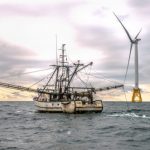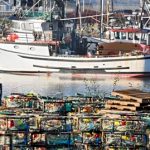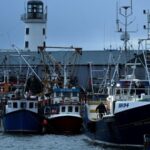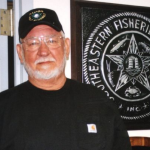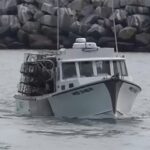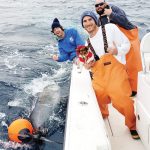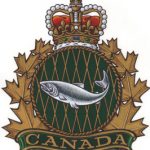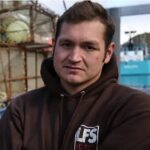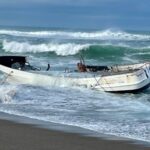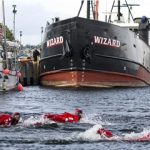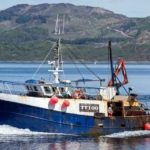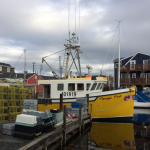Daily Archives: January 5, 2017

Wow! Council cracks up over catch shares
Everyone in the Gulf of Alaska agrees on one thing: it was the other side’s fault. Depending on who you ask, catch shares are evil incarnate or an angel of good management. Depending on who you ask, they’ll either save Kodiak or kill it. Depending on who you ask, it’s either the State of Alaska’s fault or its credit for not allowing catch shares in the Gulf of Alaska’s groundfish fishery. And depending on who you ask, they’ll either come up again or get sliced up into a handful of other little nibbles at the Gulf of Alaska bycatch problems. Either sighs of relief or defeat leaked from every mouth in the room on this past Dec. 12 when the North Pacific Fishery Management Council, which oversees all federal fisheries from three to 200 miles off the Alaska coast, indefinitely tabled a complex range of options for the Gulf of Alaska groundfish fisheries. Read the story here! 21:17
Thirty-six Washington Lawmakers back Columbia River salmon reforms
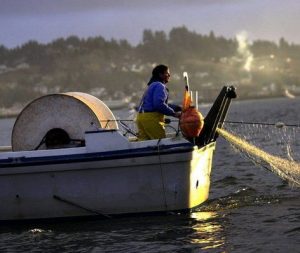 Thirty-six Washington lawmakers have signed on to a letter urging the state Fish and Wildlife Commission to push ahead in January with full implementation of the bistate Columbia River salmon reforms. Reforms adopted by Washington and Oregon in early 2013 allocated more chinook salmon to sportsmen in the main Columbia and restricted gillnetting to off-channel sites like Youngs Bay near Astoria. The reforms also called for commercial fishing that remained in the main Columbia to be done with live-capture methods — such as purse seines and beach seines — designed to harvest hatchery stocks and release wild fish.” Oregon is proposing to undo the plan based on a desire to significantly increase commercial gillnet fishing industry profits, rather than ensuring the viability of the commercial fishing industry as defined in the bistate agreement,’’ according to the letter. Read the story here 16:56
Thirty-six Washington lawmakers have signed on to a letter urging the state Fish and Wildlife Commission to push ahead in January with full implementation of the bistate Columbia River salmon reforms. Reforms adopted by Washington and Oregon in early 2013 allocated more chinook salmon to sportsmen in the main Columbia and restricted gillnetting to off-channel sites like Youngs Bay near Astoria. The reforms also called for commercial fishing that remained in the main Columbia to be done with live-capture methods — such as purse seines and beach seines — designed to harvest hatchery stocks and release wild fish.” Oregon is proposing to undo the plan based on a desire to significantly increase commercial gillnet fishing industry profits, rather than ensuring the viability of the commercial fishing industry as defined in the bistate agreement,’’ according to the letter. Read the story here 16:56
Quinault Indian Nation join West Coast crabbers on strike
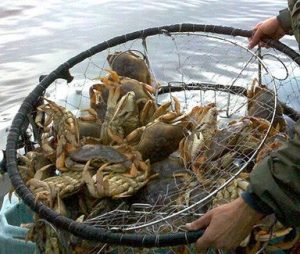 Fleets from Central California to the Canadian border are refusing to fish as the crabbing season opens along the coast. The strike is due to a price drop before Christmas, when Pacific Seafood began offering $2.75 per pound instead of $3. John Corbin, an Oregon fisherman and chairman of the Oregon Dungeness Crab Commission, said crabbing is expensive, especially with the substantial amount of bait that is used. “They’re getting us on both ends here,” Corbin said. “They’re charging us more for bait and they’re wanting to pay less for the crabs. So, it’s just cutting into the bottom line, and we just can’t do that.” On Wednesday, crabbing opened on Washington state’s coast, but no crabbing vessels set out. The Quinault Indian Nation has also joined commercial crabbers in the strike. Read the story here 16:02
Fleets from Central California to the Canadian border are refusing to fish as the crabbing season opens along the coast. The strike is due to a price drop before Christmas, when Pacific Seafood began offering $2.75 per pound instead of $3. John Corbin, an Oregon fisherman and chairman of the Oregon Dungeness Crab Commission, said crabbing is expensive, especially with the substantial amount of bait that is used. “They’re getting us on both ends here,” Corbin said. “They’re charging us more for bait and they’re wanting to pay less for the crabs. So, it’s just cutting into the bottom line, and we just can’t do that.” On Wednesday, crabbing opened on Washington state’s coast, but no crabbing vessels set out. The Quinault Indian Nation has also joined commercial crabbers in the strike. Read the story here 16:02
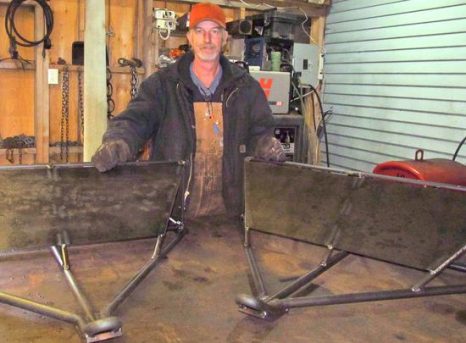
Island builder Kevin Grindle puts new take on scallop drags
The best place to find Kevin Grindle over the next few months is in his home workshop, where the inventor/builder is busy trying to fill orders from scallop fishers purchasing his newest project, a steel scallop drag. Grindle, who operates under the name Grindle Built, is a second generation shed junkie. His father, Herb Grindle, started building drags in the early 1970s, when the younger Grindle was just 10 years old. Looking up to his father, he soon learned the trades of building and welding. Several decades later, Grindle has found himself the maker of one of the hottest new fishing items around. “I have three in here right now, and that’s rare,” he said. “Usually I make them and I can’t keep them in here because the guys have already picked them up.” Read the article here 15:41
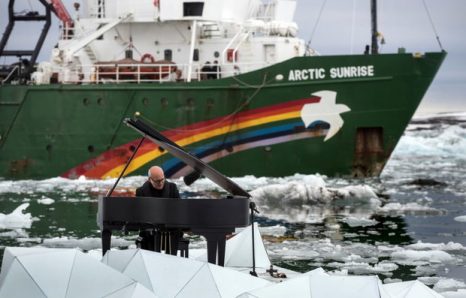
‘Big Green’ and environmental activists 2016’s biggest losers (Commentary)
The day after the presidential elections, Michael Brune, executive director of the Sierra Club, glumly called the Donald Trump victory “devastating for our climate and our future.” Well, yes, if you’re a climate-change alarmist who hates fossil fuels, you’re in for a bad four and maybe eight years. Greenpeace Executive Director Annie Leonard was even more apocalyptic, saying: “I never thought I’d have to write this. The election of Donald Trump as president has been devastating. … There’s no question, Donald Trump’s climate denial is staggering. He wants to shut down the EPA, ‘cancel’ the Paris Climate Agreement, stop funding clean energy research, and ‘drill, baby, drill.'” Ah, but if this is so crazy, why did he win? The short answer is that Americans went to the polls and rejected environmental extremism, among other things. The biggest loser on election night was America’s Big Green movement, dedicated to the anti-prosperity proposition that to save the planet from extinction we have de-industrialize the U.S. and throw millions and millions of our fellow citizens out of their jobs. Read the rest here 13:20:30
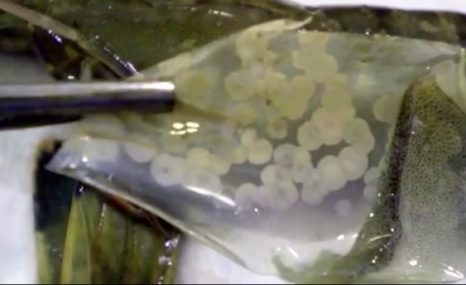
Australia: Fears grow as white spot detected in crab in Logan River
The devastating white spot disease threatening the Logan River prawn farming industry has now been detected in a crab. If retesting confirms the virus, it would be the first time the disease has transferred between species in Australia. Biosecurity Queensland tested the crab, which was found in a drainage channel near one of the infected prawn farms, this week and confirmed it initially tested positive for the virus that causes white spot. White spot, which can cause 100 per cent mortality within 10 days in farmed prawns, was first detected at a farm in Alberton, south of Brisbane, on November 22. The disease has spread to four other farms, forcing each farm to completely de-stock, a move estimated to cost the industry $25 million. Until the outbreak, Australia was considered free of white spot, which has spread throughout Asia and the Americas but does not pose a risk to humans. The detection in the crab was the first time the disease has appeared outside of a farm since six wild prawns were discovered with “low levels” of the disease on December 8. Read the story here 12:13
Nunavut court: case alleging illegal turbot fishing to go ahead
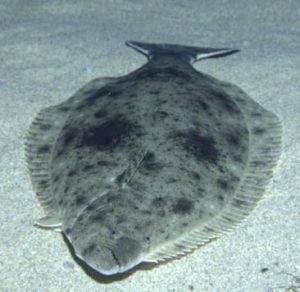 Despite the length of time their case has sat before the Nunavut court, a subsidiary of the Baffin Fisheries Coalition, along with the captain of one of the company’s fishing vessels, will still stand trial for fishing in illegal waters. That’s according to a written decision, released Dec. 12, from Justice Bonnie Tulloch of the Nunavut Court of Justice. The trial of Oujukoaq Fisheries Ltd. and its employee, David Dempsey, has twice been scheduled to proceed in an Iqaluit courtroom, most recently from Dec. 5 to Dec. 9, 2016. The co-accused face a single charge each under the Fisheries Act, dating to 2012, that alleges illegal turbot fishing in a prohibited area. But an application from defence lawyers to dismiss those charges due to unreasonable delays, filed in October 2016, cancelled the most recent trial date. Now, in her decision, Tulloch rejected that application and said the trial should be rescheduled as soon as possible. “It is a case with far-reaching implications for commercial fishermen in Canada. It is a case that deserves to be decided on its merit,” Tulloch said. Read the story here 11:39
Despite the length of time their case has sat before the Nunavut court, a subsidiary of the Baffin Fisheries Coalition, along with the captain of one of the company’s fishing vessels, will still stand trial for fishing in illegal waters. That’s according to a written decision, released Dec. 12, from Justice Bonnie Tulloch of the Nunavut Court of Justice. The trial of Oujukoaq Fisheries Ltd. and its employee, David Dempsey, has twice been scheduled to proceed in an Iqaluit courtroom, most recently from Dec. 5 to Dec. 9, 2016. The co-accused face a single charge each under the Fisheries Act, dating to 2012, that alleges illegal turbot fishing in a prohibited area. But an application from defence lawyers to dismiss those charges due to unreasonable delays, filed in October 2016, cancelled the most recent trial date. Now, in her decision, Tulloch rejected that application and said the trial should be rescheduled as soon as possible. “It is a case with far-reaching implications for commercial fishermen in Canada. It is a case that deserves to be decided on its merit,” Tulloch said. Read the story here 11:39
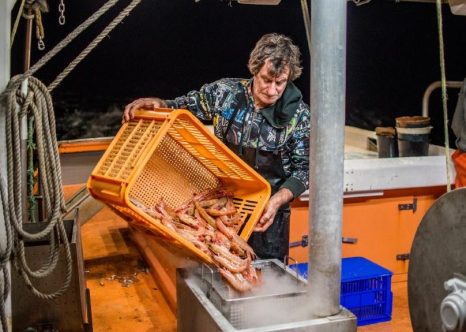
Importing seafood to Australia is like the governor of Alaska deciding to import ice – With Julian Tomlinson
Importing seafood to Australia must rank among the most jaw-droppingly gormless decisions ever made by someone claiming to have a fully functioning brain. It’s like the governor of Alaska deciding to import ice – but from a producer who uses water from a stagnant lake that is rapidly drying out. The south-east Queensland prawn farming industry is on the brink of disaster after white spot disease infected stock right before the lucrative Christmas period. Far Northern prawn farmers are rubbing their hands together and worrying at the same time. Loss of supply from the south-east should drive up demand for their product, but there are fears the disease was brought in from overseas imports and is spreading via birds. Australia has the world’s largest exclusive fishable area, waters of excellent quality, and among the most sustainable and high-quality seafood in the world. But the Aussie fishing industry has the lowest wild-harvest rate in the developed world and has been demonised and regulated so much that our supplies can’t meet domestic demand. Read the op-ed here If you’ve got time, a report also available (click here to read Australia’s Unappreciated and Maligned Fisheries. 09:40
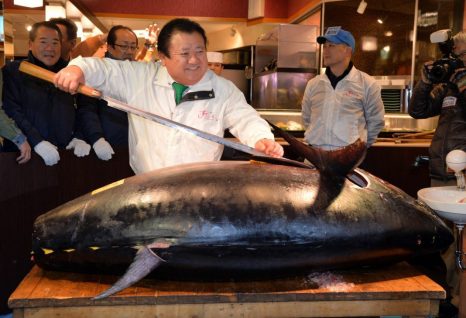
Bluefin tuna goes for $632000 in 1st Tsukiji auction of ’17
Kiyomura Co’s President Kiyoshi Kimura (C), who runs a chain of sushi restaurants Sushi Zanmai, poses with a 212 kg (467 lbs) bluefin tuna at his sushi restaurant outside Tsukiji fish market in Tokyo, Japan, January 5, 2017. Kimura won the bid for the tuna caught off Oma, Aomori prefecture, northern Japan, with a 74 million yen (633,000 USD) at the fish market’s first tuna auction this year. Kimura bought the most expensive tuna for the sixth consecutive year during the annual auction held in the Tsukiji Fish Market. The winning bid for the first tuna on the market past year was just 14 million yen. According to local sources, the ginormous blue tuna was sold to a major restaurant chain known as Sushi Zanmai. Read the rest here 08:15
Pacific Choice play for pocket change threatens to sink a second crab season – End crab strike: Pay the full $3
 North Coast commercial crabbers had a bad enough time last season, thanks to domoic acid spikes. But at least they could blame that on algae blooms and health concerns. This season could be undone by something entirely within human control: The unwillingness of seafood company Pacific Choice to shell out 25 cents more per pound for Dungeness crab meat. Crab prices have been set at $3 per pound since the November opening of the season; Pacific Choice wants to pay 25 cents less. The price dispute has put another crab season on hold. Local crab boats, if they stooped to selling crab for $2.75 per pound, would lose between $7,000 to $10,000 per average medium to small boat, according to the Humboldt Fishermen’s Marketing Association. Read the op-ed here 07:50
North Coast commercial crabbers had a bad enough time last season, thanks to domoic acid spikes. But at least they could blame that on algae blooms and health concerns. This season could be undone by something entirely within human control: The unwillingness of seafood company Pacific Choice to shell out 25 cents more per pound for Dungeness crab meat. Crab prices have been set at $3 per pound since the November opening of the season; Pacific Choice wants to pay 25 cents less. The price dispute has put another crab season on hold. Local crab boats, if they stooped to selling crab for $2.75 per pound, would lose between $7,000 to $10,000 per average medium to small boat, according to the Humboldt Fishermen’s Marketing Association. Read the op-ed here 07:50
BREAKING! Fire Burns on Oil Platform in Gulf of Mexico
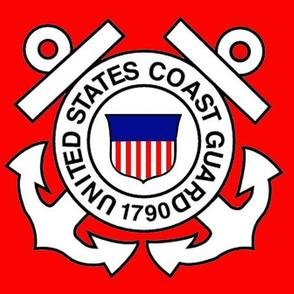 The Coast Guard says it’s responding to a fire on an oil platform in the Gulf of Mexico off the coast of Louisiana. A Coast Guard news release says the fire was reported around 2:30 a.m. Thursday on an oil platform about 80 miles south of Grand Isle, Louisiana. The Coast Guard says four people aboard the platform evacuated and were rescued by a supply vessel. No injuries have been reported. Four vessels are fighting the fire and the cause is under investigation. Updated click here 07:04
The Coast Guard says it’s responding to a fire on an oil platform in the Gulf of Mexico off the coast of Louisiana. A Coast Guard news release says the fire was reported around 2:30 a.m. Thursday on an oil platform about 80 miles south of Grand Isle, Louisiana. The Coast Guard says four people aboard the platform evacuated and were rescued by a supply vessel. No injuries have been reported. Four vessels are fighting the fire and the cause is under investigation. Updated click here 07:04

































